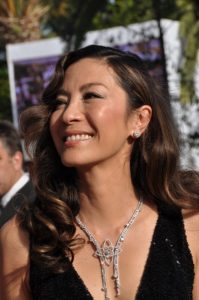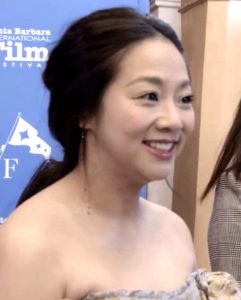Everything Everywhere All At Once is a movie that needs no introduction. Taking the film world, or rather the world in general by storm, it is currently estimated to be the most awarded film of all time, marking a significant breakthrough for Asian actors within the Western sphere. However, despite the myriad of discussion and analyses surrounding this work, I have yet to come across one that was focused on its Chinese elements. Thus, in honour of Chinese New Year coming up, I decided to take this matter into my own hands and take a look at how the Chinese languages (Mandarin and Cantonese), culturally Chinese props, and Chinese New Year itself contributes and interacts with the film.

Michelle Yeoh, who plays Evelyn (Image via Georges Biard on Wikimedia Commons)
Everything everywhere, surprisingly enough, opens not with English, but with Mandarin. This immediately alienates the assumedly English-speaking audience, placing them in the same linguistic plight that Evelyn faces as a Chinese immigrant in America. The mixture of Mandarin, Cantonese, and English spoken as the scene progresses only mixes up things further, allowing audiences to share in the feeling of chaos that Evelyn is suffering. The Daniels, the main masterminds behind the film, continue to utilize the undeniable divide between the Chinese languages and English as a tool to influence audience feeling later on in the movie, such as having Evelyn say “I’m thinking” in both English and Cantonese to Alpha Waymond and Gong Gong respectively, so that viewers can auditorily experience the split in universes; meanwhile Waymond, when discussing their divorce in the car in a local divergent universe, specifically switches to English from Mandarin to tell Evelyn that she ‘always get pulled away’, and it is after this switch that Deirdre pulls Evelyn back into her original universe, with the change in language signalling the shift in situations.
However, this manipulation of languages isn’t a tactic that is limited to The Daniels — Evelyn herself takes advantage of the fact that she is the sole character (at least in her original universe) that can speak all three languages. She uses her fluency in Cantonese to mistranslate what Joy meant to tell Gong Gong, preventing her from coming out to Evelyn’s close-minded father; she also uses English when she reacts to Waymond’s proposal of divorce to avoid Gong Gong from finding out about their marital troubles. What’s significant about these instances is that every time she uses her trilingual abilities against the other characters, she hinders understanding and communication amongst all the family members, which makes the scene where she finally stands up for herself, her husband, and her daughter all the more important. She starts her speech by defending herself and her daughter to Gong Gong in Cantonese, then switches to English so that Joy can understand more easily the affection she is trying to express, then changes to Mandarin to let Waymond understand that she was directing the sentiment towards him, and finally shifts back to Cantonese to help Joy tell Gong Gong that Becky is Joy’s girlfriend, thus coming full circle with the first time she used her multilingualism to bar communication in the movie, showcasing just how much she has grown as a character.

Ke Huy Quan, who plays Waymond (Image via GabboT on Wikimedia Commons)
While the Daniels may have intended to use the different languages as a barrier between characters, as they mentioned in a Comics Beat interview, I would like to propose that it is the differences between these languages, and what they signify to Evelyn and Waymond, that allows them to have Mandarin as a language of love. Evelyn exhibits two significant acts of cruelty towards Waymond throughout the movie, the first being her telling him in Mandarin that her life was ‘so beautiful’ without him, and that she should ‘not have gone’ with him all those years ago, and the second being her stating ‘no more running’ in English while she signs the divorce papers. With the first incident, this sentiment of regret and hating the life she built with him was not a reaction born out of pettiness or spur-of-the-moment feeling, but an expression of the disappointment and disapproval she had long accumulated against him in the years where she felt trapped as an unsuccessful immigrant, never able to fulfil her father’s expectations. Conversely, her statement in the second incident can be attributed to her recent disillusionment with reality, as well as a petty retort against her father, since the phrase directly corresponds to how Gong Gong accused her of ‘always running away’ earlier in the movie, signalling this reaction as one motivated by a want to rebel against her father, rather than a genuine expression of her desire to end her relationship with Waymond. These instances, paired with how she later uses Mandarin to be vocally appreciative and loving towards Waymond (for the first time in the movie), showcases how she is much more genuine when using Mandarin, and uses it to express her true feelings of love (or lack thereof) towards Waymond. Similarly, the now-iconic ‘In another life, I would have really liked just doing laundry and taxes with you.’ line said by Waymond was spoken in Mandarin, and his other attempts at reconnecting with Evelyn — asking if she wanted to go on vacation to de-stress, telling her why he proposed a divorce, and so on — were also in Mandarin, showing how he too uses Mandarin to express genuine love towards her.
As I’m sure everyone is tired of all the talk about linguistics, let’s move on to the physical tools that the Daniels utilize in Everything Everywhere, shall we? While there are a myriad of props that could be linked to Chinese culture, most are used to simply add more authenticity to the characters’ surroundings, with the narratively significant ones mainly found in the Chinese New Year party set. As the scene starts, we get a glimpse of the couplets next to the entrance, which translate to “fortune and wealth in the coming of spring” (迎春接福人財旺) and “harmonious family and fortune in all things” (和諧家庭萬事興) respectively. Considering how Evelyn’s fortune had been pretty unlucky given everything she had experienced in the film so far, plus her dire financial situation, and her definitively not harmonious family, these couplets seem especially ironic, setting an example for the other props we will see in this scene. These couplets could also be seen as potential foreshadowing, since Evelyn further destroys her chances at wealth by vandalizing her own shop, and worsens the unharmonious family dynamic by signing the divorce papers.
Speaking of which, in her speech before she signs the divorce papers, where she complains about how she is simply ‘going around in circles’ doing the same monotonous chores, Evelyn happens to be surrounded by ‘good fortune’ character papers, presenting a pretty contradictory image. The irony of these props is further heightened as the scene goes on, since the first time we as the audience sees the couplets above Evelyn (which are wishing her success in her business), is exactly when Deirdre walks in with the papers that will take away the very business the couplets are wishing well for. To be fair, while the two couplets generally wish for ‘success in business’, the banner on the right translates in full to ‘success in your deepest ambitions and good fortune in all things’ (鴻圖大展萬事興), which not only wishes for success in business ambitions, but specifically one’s deepest ambitions in business-making, ironically driving home the fact that not only has Evelyn failed in her economic business, but she has also failed to achieve the American dream that she had originally hoped for. Interestingly, the left banner actually translates to ‘success in business across four seas’ (生意興隆通四海). While this phrase is simply referring to international success, I think the ‘four’ is important here, since it is implied that in order to achieve this success, four obstacles (the seas) must be passed through or resolved. I believe that the four seas actually represent the four central characters of Waymond, Joy, Gong Gong, and Deirdre, as it is Evelyn resolving conflict with each one of them that the film is able to reach its conclusion, and she succeeds in her enterprise of saving both herself and her daughter.

Stephanie Hsu, who plays Joy (Image via Lyn Fairly Media on Wikimedia Commons)
Aside from the props associated with it, Chinese New Year itself is significant within Everything Everywhere, especially in the aforementioned scene. Chinese New Year is a holiday focused on the removal of the bad and old, while welcoming the new and the good. And given director Daniel Kwan’s Chinese roots, Evelyn’s situation taking a turn for the worse during Chinese New Year, as she becomes disillusioned with life and consequently wrecks both her business and marriage, is definitely a deliberate choice. And the fact that it is within the same setting of the Chinese New Year party where she gains a new perspective on her relationships with people, as well as a positive spin on the nihilism that she was previously feeling, corroborates with the holiday’s theme of renewal of all things good. Additionally, the association of family to the holiday is made apparent within the plot, since Evelyn both destroys and mends her familial relationships with Waymond, Joy, and Gong Gong during the Chinese New Year party, and her bonding with Deirdre, who is her romantic partner in the hotdog fingers universe, can also be counted as another family member who she reconnects with.
Although all of this is simply scratching the surface of what can be gleaned from the movie when watched through Chinese lens, I hope this incomplete analysis inspires you to give the movie another watch and find some hidden details for yourself. I mean, what better movie to watch during Chinese New Year, right?
Featured image: Everything Everywhere All At Once logo poster via Wikimedia Commons
